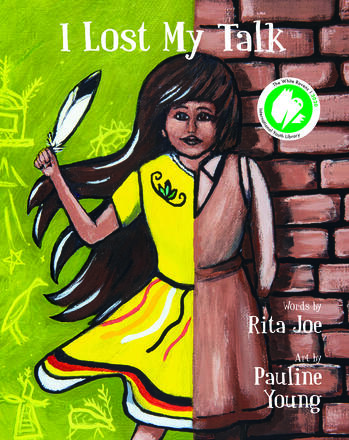
I Lost My Talk
Paperback edition of the celebrated poem turned picture book about Mi'kmaw elder Rita Joe's residential school experience and loss of language
Description
Rita Joe's powerful poem is presented anew in this children's picture book with illustrations from Pauline Young. A story of recovering what was lost in residential school, I Lost My Talk will raise conversation about language as a vehicle for truth and reconciliation. Published simultaneously with the companion book I'm Finding My Talk.
I lost my talk
The talk you took away
When I was a little girl
At Shubenacadie school.
One of Rita Joe's most influential poems, "I Lost My Talk" tells the revered Mi'kmaw Elder's childhood story of losing her language while a resident of the residential school in Shubenacadie, Nova Scotia. An often quoted piece in this era of truth and reconciliation, Joe's powerful words explore and celebrate the survival of Mi'kmaw culture and language despite its attempted eradication.
A companion book to the simultaneously published I'm Finding My Talk by Rebecca Thomas, I Lost My Talk is a necessary reminder of a dark chapter in Canada's history, a powerful reading experience, and an effective teaching tool for young readers of all cultures and backgrounds. Includes a biography of Rita Joe and striking colour illustrations by Mi'kmaw artist Pauline Young.
Awards
- Commended, Jury-selected, from Sea to Sea to Sea: Celebrating Indigenous Picture Book collection (IBBY Canada) 2020
- Short-listed, Atlantic Publishers Marketing Association Best Atlantic-Published Book Award 2019
- Long-listed, First Nations Communities Read, Children's Award 2020
- Commended, Globe & Mail Top 100 selection 2019
- Winner, CBC Best Picture Book 2019
Reviews
"How do you transform a story of so much pain into something that can be shared with children? Separation, isolation, trauma, abuse? Well, Rita Joe fought, grew, survived, and turned trauma into poetry.... The art to accompany this poem is hauntingly perfect: the drab muddy sameness of the residential school feels like a sepia toned photograph dropped in a puddle of grief. The emerging clarity towards the end merges nature and an urban environment on the other side of the school, as the poet comes forward to find her talk and share her story.
This is the time for these books. Well, no: it's past time. I wish I'd seen them as a student, myself, but I'm glad they're out there now, at a time Canadians are reckoning with our past and present— and choosing future directions. It's time Rita Joe was allowed to speak directly to us, children and adults alike, and that Rebecca Thomas was given the chance to bring her sequel to us, too. I thank Nimbus for sending me these books. I encourage you, all of you, to get your own copies, examine them, read them, and think about what we're being told."
https://childrensbookroom.wordpress.com/2020/09/23/nimbus-reviews-i-lost-my-talk-im-finding-my-talk/
"I Lost My Talk and I'm Finding My Talk are inseparable sister pieces meant to stand side-by-side.... Beautifully illustrated by Pauline Young, these books read like a conversation—one that Joe and Thomas invite readers young and old to join in."
—[Edit] Magazine (Summer 2020)"This picture book version of I Lost My Talk is best read with Rebecca Thomas's I'm Finding My Talk. These haunting, evocative books bring an original approach to the exploration of Canadian residential schools in picture books. For readers and teachers who appreciate fact—based information, there is also A Short History of Residential Schools at the end of I Lost My Talk. Educators, librarians, and families will find their classrooms and book collections invaluably enriched by these books. They are real tools of truth and reconciliation; as such, they belong on every bookshelf in Canada and beyond.
—CM Reviews, Highly Recommended(5 stars)"Published as a companion to the picture book I Lost My Talk, featuring the famous poem by Rita Joe, both volumes explore the legacy of Canada's residential schools. They feature vibrant illustrations by Pauline Young that bring the words alive with emotional nuance. This remarkable pair of books possesses the rare ability of being suited to readers of all ages: three to six-year-olds, the traditional intended audience of picture books, will be captivated by the bright, lively illustrations; elementary and middle school children will find their Social Studies curriculum enriched by experiencing these important concepts rendered creatively; teens and adults will gain insight and empathy by enjoying these beautiful poems." — Canadian Review of Materials (Winnipeg, MB)